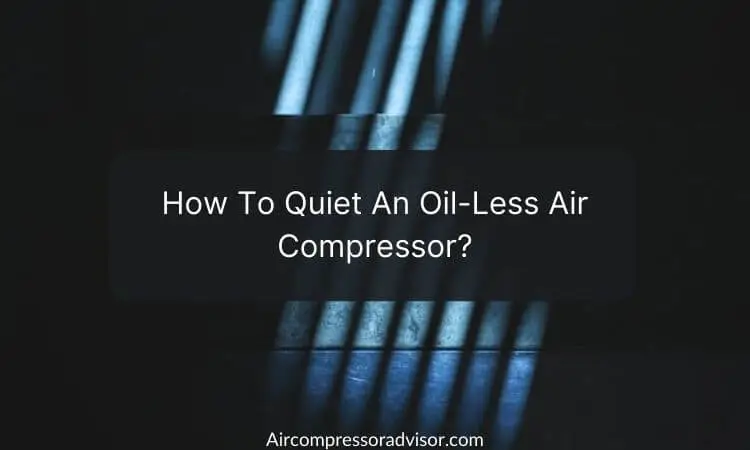How To Quiet An Oil-Less Air Compressor - 6 Effective Methods

Oil-less air compressors are popular due to their low maintenance as well as clean operation. These compressors are ideal for home workshops, small businesses, and DIY enthusiasts.
However, one of their drawbacks is that they can be quite loud and if you're using an oil-less air compressor in a confined space, the noise can be quite distracting. Fortunately, there are several ways to quiet an oil-less air compressor.
In this article, I will go over some of the most effective methods for reducing the noise output of an oil-less air compressor so without any further ado let's take a look at it.
Methods To Reduce The Noise Of An Oil-less Air Compressor:
Create A Soundproof Enclosure:
If you're looking for a more long-term solution to quieting your compressor then you may want to consider creating a soundproof enclosure. A soundproof enclosure is a box that is designed to reduce the noise level by trapping the sound waves inside and this method is effective but requires a bit more work and planning. You'll need to build the enclosure with soundproof materials and make sure it's large enough to fit the compressor. You'll also need to make sure that the enclosure has proper ventilation to prevent the compressor from overheating.
Use A Sound Muffler:
One of the easiest ways to quiet an oil-less air compressor is by using a sound muffler. A sound muffler is a device that helps to reduce the noise produced by an air compressor.
Cover It With A Sound Blanket:
Another way to quiet an oil-less compressor is by covering it with a sound blanket. A sound blanket is a specially designed material that helps to absorb sound waves and by covering the compressor with a sound blanket, you can effectively reduce the noise level.
Move It To A Different Location:
Sometimes, the easiest way to quiet it is by simply moving it to a different location and if you're using the compressor in a small room or a residential area consider moving it to a garage or outdoor space. This will help to reduce the amount of noise that is heard inside the building.
Adding Rubber Grommets:
Rubber grommets are small, rubber pieces that are used to reduce vibration and by adding rubber grommets to the air compressor, you can reduce the amount of vibration that is transferred to the surface it's sitting on. This in turn will reduce the noise level.
Regular Cleaning And Maintenance:
Finally, one of the best ways to ensure that your oil-less air compressor stays quiet is by performing regular cleaning and maintenance. Dirty or clogged air filters can cause the compressor to work harder as well as to produce more noise and so by cleaning or replacing the air filters, you can reduce the noise level. Additionally, making sure that the compressor is well-lubricated and in good working condition can also help to reduce noise.
Frequently Asked Questions (FAQ):
How Loud Are Oil-Less Air Compressors?
The noise level of an oil-less air compressor can vary depending on the model and size. So it's important to check the manufacturer's specifications for the noise level of a specific oil-less air compressor before purchasing to ensure it meets your noise requirements.
How Can I Tell If My Oil-Less Air Compressor Is Too Loud?
If your oil-less air compressor is causing discomfort or distraction, it's likely too loud. You can also use a sound level meter to measure the noise level and compare it to the recommended noise exposure limits.
If the noise level exceeds these limits, it's too loud and needs to be reduced.
Are Oiled Air Compressors Quieter?
Oiled air compressors can be quieter than oil-free air compressors because the oil acts as a lubricant, reducing friction and vibration within the compressor resulting in less noise.
Conclusion:
Overall, there are several effective ways to quiet an oil-less air compressor. Whether you choose to use a sound muffler, cover it with a sound blanket, add rubber grommets, create a soundproof enclosure, move it to a different location, or perform regular cleaning and maintenance, there's a solution that will work for you.
By reducing the amount of noise produced by your compressor you can significantly reduce the noise level and enjoy a quieter workspace. If you find this guide to be helpful then share it and have a nice day.